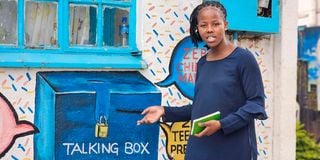From Kibra to the United Nations: The 24-year-old shaping global policy

Lydia Achieng', a mentor who is changing thousands of lives in Kibra, when she spoke to Nation.Africa on October 7, 2024, in Kibra, Nairobi. She serves on two UN bodies.
What you need to know:
- Lydia recounts how they proactively address the alarming rates of sexual harassment in the informal settlement.
- Through a community sensitisation programme, they educate students and teachers about harassment.
In Makina, the heart of Kibra, Nairobi, 24-year-old Lydia Achieng' stands as a testament to resilience and empowerment.
With a bright smile and a passion for change, she has transformed her life from a mentee to a lead mentor and program assistant at Polycom Girls, an organisation dedicated to uplifting young girls and boys through mentorship and education.
“I graduated with computer science, but my journey took a different direction,” Lydia shares, her enthusiasm palpable.
“I became a beneficiary of the organisation, which first came to our school to mentor girls. We learned so much in those sessions; it felt like sisterhood.”
After completing her Form 4 in June 2017, she took a step forward and joined Polycom in December of that year.
“Initially, I just wanted to understand what the entity was all about,” she says.
“But I quickly became involved, volunteering as a mentor and working to scale our outreach to 50 schools across Nairobi and Homa Bay counties.
“These schools are a mix of primary and secondary institutions, many located in the less affluent areas that Polycom primarily serves.”
Last year, she was promoted to lead mentor, a progress she describes as the epitome of hard work.
As a lead mentor, she guides incoming mentors, helping them navigate their roles. Central to her mission is the “talking box,” a discreet receptacle placed in all 50 partner schools. It serves as a safe space for girls to voice their struggles anonymously—be it concerns about sexual harassment, menstrual health, or social issues.
“It’s heartbreaking to read what these girls are going through,” Lydia confides, her voice softening. “The issues they raise range from urinary tract infections and the need for sanitary towels to alarming cases of gender-based violence.”
Working tirelessly to provide support, she recounts how they proactively address the alarming rates of sexual harassment.
“We launched a community sensitisation program to educate students and teachers about what constitutes harassment. Many don’t even realise they’re crossing the line. We found that they often don't equate certain behaviours with harassment unless they are properly informed,” she explains.
Yet, despite the strides being taken, Lydia admits that there are challenges.
“There are moments when a girl comes to me with a problem, and I wish I could do more,” she says ruefully.
“When they share experiences of gender-based violence at home or harassment by teachers, it can be overwhelming. We can only provide referrals to partner organisations; we don’t have the capacity to intervene directly.”
The organisation currently employs 10 female and five male mentors, acknowledging the importance of addressing the boy child too.
“In 2020, we realised that the boys wanted to be a part of this conversation as well. Mentoring boys has allowed us to address the issues from both sides,” says Lydia, a smile returning to her face.
For her, the most rewarding moments often come unbidden during her day-to-day life.
“When girls run up to me and say thank you, it fills my heart with joy,” she beams. “I can see they’ve conquered what they were facing, and that’s what drives me.”
Her dedication has not gone unnoticed. Lydia currently serves as the chair of the United Nations Population Fund Youth Advisory Panel and is a member of the Leaving No One Behind advisory board of the United Nations.
“Through these roles, I advocate for marginalised individuals, especially girls and women living in informal settlements,” she elaborates. “It's crucial to bring their voices to the table.”
Lydia’s journey from student to mentor, and now to leader, underscores the transformative power of mentorship and community.
To the young girls aspiring to bring change, she has a resounding message: “Go for it! Your dreams are valid, and you can achieve remarkable things. Remember, being a mentor is not just about guiding others; it’s a learning process for you too.”





